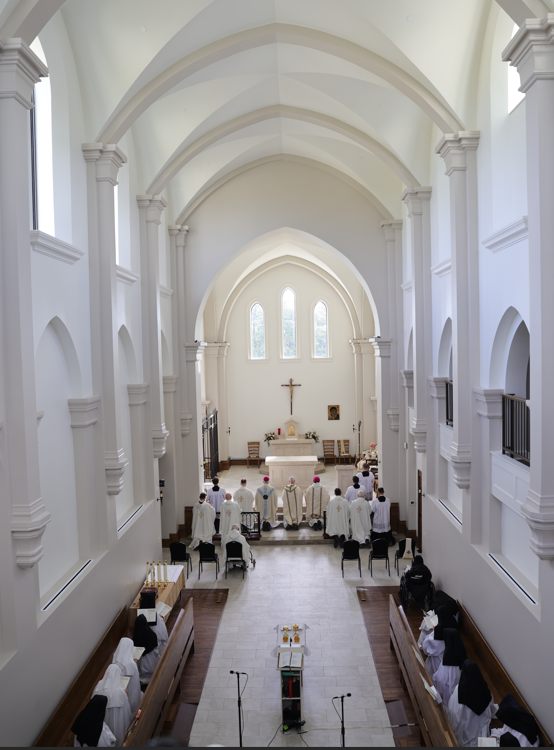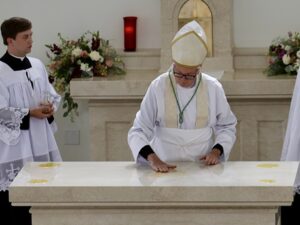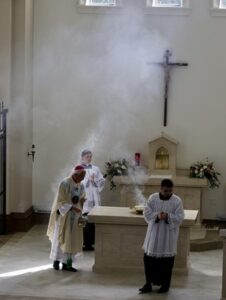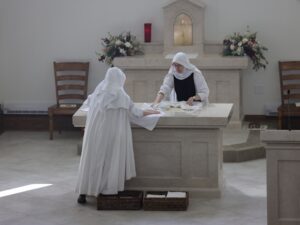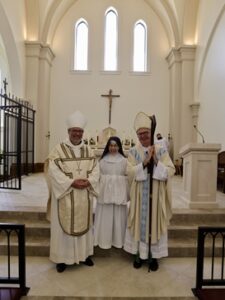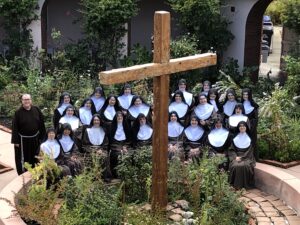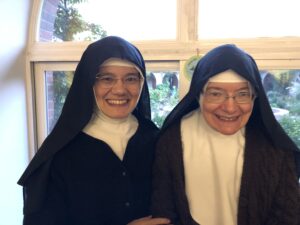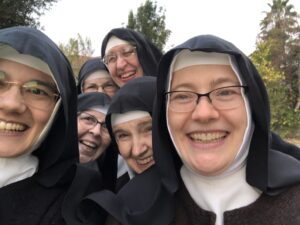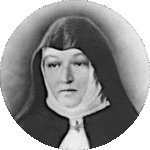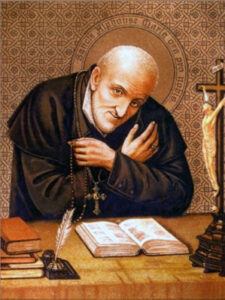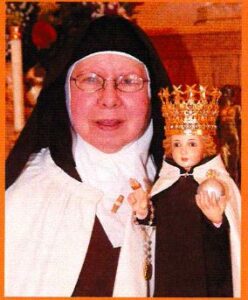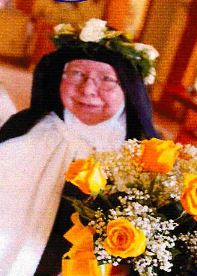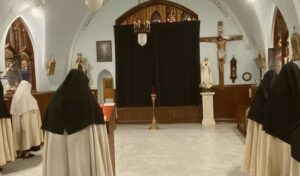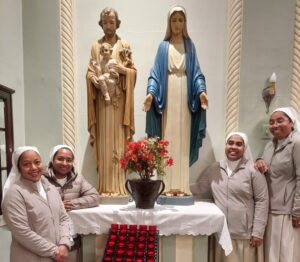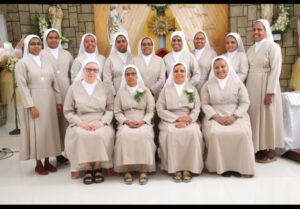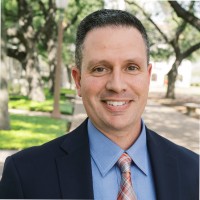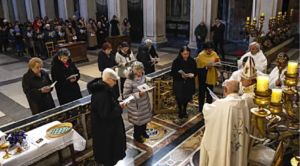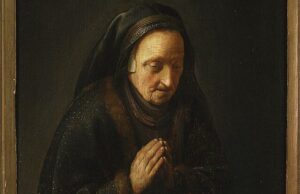The Carmelite Monastery of the Holy Cross
Celebrates 75 Years in the Heart of the Church
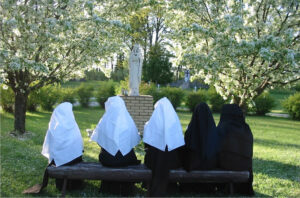 The “Holy Cross” has always been more than a mere title for the Monastery of Discalced Carmelite Nuns in Iron Mountain, Michigan. Together with the accompanying presence of Mary, it has in many ways shaped the life and history of the monastery’s seventy-five years of existence in the Diocese of Marquette.
The “Holy Cross” has always been more than a mere title for the Monastery of Discalced Carmelite Nuns in Iron Mountain, Michigan. Together with the accompanying presence of Mary, it has in many ways shaped the life and history of the monastery’s seventy-five years of existence in the Diocese of Marquette.
The roots of this Carmel can be traced back to the twelfth foundation made by Holy Mother St. Teresa of Jesus in Caravaca, Spain, leading up to the Queretaro Carmel in Mexico. It was this community which in 1916, due to the persecution of the Church there, eventually found a warm welcome in Grand Rapids, Michigan. Vocations flourished and soon they began making several foundations of which the monastery in Iron Mountain was the seventh.
After a difficult eighteen-month search for a suitable site for the proposed foundation, Most Rev. Thomas L. Noa was able to report his success to the Carmel of Grand Rapids on November 1, 1950. It was the very day on which the dogma of the Assumption was formally defined in Rome. Shortly after this, on November 21, the Feast of the Presentation of Mary, the first group of nuns went to Iron Mountain to oversee the renovations which would be necessary to transform the small Horton Hotel on East B Street into a cloistered monastery.
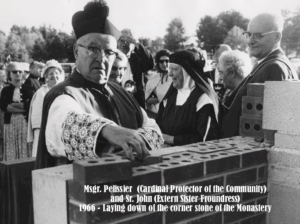 Under the paternal eye of Msgr. A.C. Pelissier, the beloved “Cardinal Protector” of the community, the remodeling was completed in four months. This made it possible for the monastery to be canonically erected on Easter Sunday, March 25, 1951, with the Solemn Mass of Dedication and establishment of Enclosure on April 11, Solemnity of St. Joseph.
Under the paternal eye of Msgr. A.C. Pelissier, the beloved “Cardinal Protector” of the community, the remodeling was completed in four months. This made it possible for the monastery to be canonically erected on Easter Sunday, March 25, 1951, with the Solemn Mass of Dedication and establishment of Enclosure on April 11, Solemnity of St. Joseph.
Despite additions made to the house on “B” Street, the blessing of many vocations made it necessary to plan for the building of a new Monastery. With the help of Saint Joseph, Carmel’s special protector and provider, and the generous support of so many good people, the new monastery, built in the form of a Cross, became a reality. The dedication was held on July 16, 1966, Solemnity of Our Lady of Mt. Carmel.
This year, March 25, 2026, the Monastery of the Holy Cross reached the milestone of its 75th Jubilee. Today seventeen nuns, including four Sisters in formation, gratefully and joyfully continue their daily efforts to live the charism of Carmel handed on to them. Praised be Jesus Christ!
A Life of Love, Prayer and Sacrifice
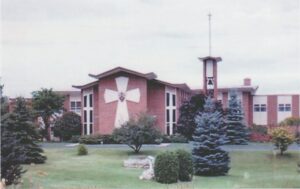 The Carmel of the Holy Cross is located in the vast wooded territory known as Michigan’s Upper Peninsula. Here lives a community of seventeen Discalced Carmelite nuns ranging in age from 27 to 101. Our Lord called these women together from many different backgrounds and from varied States as California, New Jersey, Texas and as near as Michigan and Wisconsin.
The Carmel of the Holy Cross is located in the vast wooded territory known as Michigan’s Upper Peninsula. Here lives a community of seventeen Discalced Carmelite nuns ranging in age from 27 to 101. Our Lord called these women together from many different backgrounds and from varied States as California, New Jersey, Texas and as near as Michigan and Wisconsin.
The Carmelite life is a balance between the eremitical spirit and a life in community. Silence and solitude are sought as pre-eminent means for fostering a life of prayer. Observing papal enclosure and wearing the traditional habit of the Order, they follow the life given them by their Holy Mother Saint Teresa of Jesus. Their goal is union with God – “to love Jesus and to win souls for Him so that He may be loved,” as St. Therese of Lisieux put it. The Carmelites use the same means Jesus Himself used in His hidden life at Nazareth and in His death on the Cross: prayer and sacrifice. They strive to give their all for the Church, particularly for priests and seminarians.
The monastery bell summons the nuns to various community exercises: daily Mass, the Hours of Divine Office, and mental prayer, the characteristic “work” of this Order of prayer. Devotion to Our Lady permeates the life of Carmel, for “Carmel is All Mary’s.” This devotion is expressed by some cherished traditions such as the daily Rosary and Litany of Our Lady, the Salve Regina solemnly chanted every Saturday evening, and the appointment of one sister each week to be “chaplainess of the Blessed Virgin Mary” —honoring Our Lady as each one feels inspired.
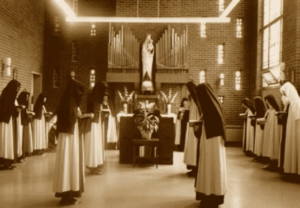 Even during work the Carmelites strive to observe silence. Besides ordinary tasks such as cooking, sewing habits, laundry and cleaning, the nuns bake and cut altar breads. The sisters also make articles to be sold in their gift shop at the entrance to the monastery. These include rosaries, scapulars, crocheted items, note cards and others. Within the spacious grounds of the enclosure are two large vegetable gardens cultivated by the sisters.
Even during work the Carmelites strive to observe silence. Besides ordinary tasks such as cooking, sewing habits, laundry and cleaning, the nuns bake and cut altar breads. The sisters also make articles to be sold in their gift shop at the entrance to the monastery. These include rosaries, scapulars, crocheted items, note cards and others. Within the spacious grounds of the enclosure are two large vegetable gardens cultivated by the sisters.
Saint Teresa incorporated two hours of recreation into the Carmelite’s day to provide healthful relaxation at which time the silence is dispensed. Ordinarily, the sisters bring handwork, but on occasion they go out to the garden or do some other outdoor activity. Sometimes they simply walk together on the grounds visiting one of the shrines, including their own cemetery surrounded by beautiful woods and fields. Tradition calls for a “play” on certain occasions which often includes a good bit of comedy. Thus, the Carmelite nuns live a life of love, prayer and sacrifice in simplicity and joy and, as Saint Teresa wrote centuries ago, “each one feels herself unworthy to have deserved to come to such a place…the Lord has so multiplied their satisfaction that they clearly understand the Lord has given them a hundredfold for the one they left; and they are never tired of thanking His Majesty.”
https://holycrosscarmel.com
vocation@holycrosscarmel.com
